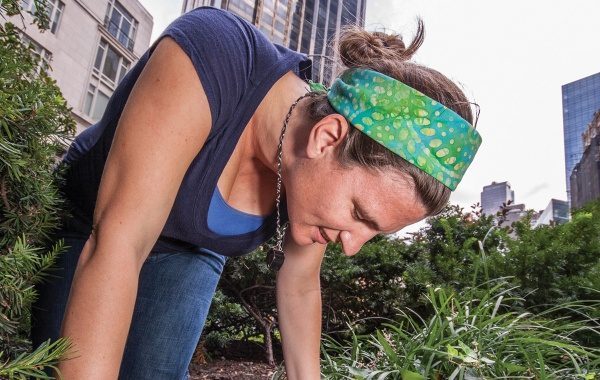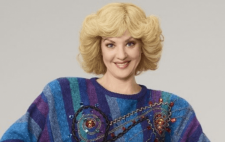When Amy Savage, PhD, hits the lab, she’s usually crouched on hands and knees somewhere on a grassy median in Camden. It’s quite different from the usual test tubes and microscopes you associate with research, but it makes sense when you consider what she’s studying: ants.
Lately Savage has detected a change in the diet of her subjects and that’s cause for concern. Savage’s research has shown that altering an ant’s diet to make it more carb-heavy – as we do when we drop, say, a hot dog bun on the grass – stimulates them to seek out more fat, and that means they’ll be eating more insects, which could have negative affects on the environment.
“We’re taking this really important predator and changing its behavior,” says Savage, an assistant professor of biology at Rutgers University-Camden. “There are consequences for the diversity of the entire community.”
As Savage tracks the tiny insects, other South Jersey women are also making their mark in science. They are smart, competent scientists conducting much-needed research that will change the world.
Andrea Russo, MD
You could say Andrea Russo, MD, is going where no man has gone, at least in her research.
Russo studies the stark differences between the sexes when it comes to cardiac care: women are more likely to die after a heart attack than men, and they’re less likely to be prescribed common heart medications. She’s also doing something groundbreaking with her research: including women in her trials. Russo, who is a professor of medicine at Cooper Medical School of Rowan University and director of electrophysiology and arrhythmia services at Cooper University Hospital, is currently preparing to study the use of a cardiac implant device and will include women in the clinical trial.
At a recent meeting with other scientists participating in the same study, “Someone said to me, ‘Oh, I heard you’re putting these devices in women,’” Russo recalls, noting that the researchers at other hospitals were only including men in their trials. The reason? They considered the device too big for women.
“Meanwhile, at my site, 50 percent of the patients were women,” she says.
“Women represent the minority in cardiology,” she adds. “I think maybe just having more women being principle investigators in these studies, more women conducting research, would make a big difference.”
Esther Deblinger, PhD
When Esther Deblinger, PhD, entered the field of childhood trauma and abuse treatment some 30 years ago, it was clear she’d have to figure out on her own how to help her young patients.
“There was a lot of research suggesting childhood sexual abuse could lead to lots of problems,” she says. “However, there was no research looking at how to overcome that. We were operating a clinic, and there was no known, documented, effective therapy.”
So Deblinger set out with her colleagues to create an effective treatment.
Today, she is the co-director of the Child Abuse Research Education and Service (CARES) Institute of Rowan University, and her treatment model, which she calls trauma-focused cognitive behavioral therapy, is effective in treating children traumatized by abuse, neglect, natural disaster and more.
Over the course of 12 to 16 treatment sessions, children are educated about their trauma, taught coping and relaxation skills, and encouraged to share their experience by writing their own book. Most importantly, Deblinger says, “they learn the experiences of the past need not be the experiences of the future.”
Deblinger’s treatment model is so successful – she estimates a recovery rate of about 80 percent – that it’s been replicated beyond South Jersey.
“Children are quite resilient,” she says. “And the more you show them you believe in their resilience, the stronger they become.”
Dorothy Bird, MD
During her plastic surgery residency five years ago, Dorothy Bird, MD, began research observing how DNA affects the healing process.
Now a reconstructive plastic surgeon at Cooper University Hospital, Bird has returned to her research – only now as the head of the lab. Under her charge, the work is focused on developing better wound-healing therapy for patients who have undergone radiation as treatment for cancer.
“Radiation therapy is one of the important modalities we have for treating cancers,” Bird says. “I’m interested in why it makes wounds heal so poorly.”
The lab, which is affiliated with the MD Anderson Cancer Center at Cooper, is just getting off the ground. Bird spends four days a week as a dedicated surgeon and one full day as a scientist. Although she loves the hands-on work of peering at cell structures in petri dishes, Bird’s new role is to get the word out about her research and secure funds to continue it.
“We’ll be looking at how radiation impacts cells and hopefully developing therapies that alleviate the pain and suffering of abnormal wound healing,” she says.
Kaitlan Baston, MD
Despite the fact that nearly everyone knows a family that has been impacted by America’s ongoing opioid crisis, substance use disorder remains mired in stigma. Kaitlan Baston, MD, medical director of Cooper University Health Care’s addiction medicine program, is working to reduce that stigma through science.
Using a growing “bio-bank” of genetic data from live patients, plus the toxicology reports from patients who’ve died due to overdose, Baston and her colleagues from the Coriell Institute for Medical Research are studying the genetics of opioid dependencies.
Eventually, she hopes DNA testing will be able to show if a person has a genetic predisposition to developing an addiction.
“It’s not a moral failing,” she says. “If someone takes oxycodone and feels sick to their stomach, they’re not a superior person. They just won the genetic lottery.”














